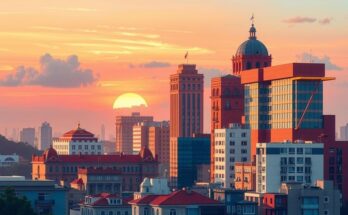Malawi has reduced its 2025 economic growth forecast from 4.0% to 3.2%, amidst rising inflation resulting in protests led mainly by street vendors. The inflation rate reached 28.5%, triggered by foreign exchange shortages hindering essential imports. The government plans to enhance production and combat the black market for currency while addressing public debt and fiscal challenges.
Malawi has revised its economic growth forecast for 2025, lowering it to 3.2 percent from the previously estimated 4.0 percent, amid rising public discontent related to inflation. Protests, mainly involving street vendors, have erupted in urban areas such as Lilongwe and Blantyre, as citizens express dissatisfaction over the government’s inability to manage double-digit inflation, which they claim jeopardizes their livelihoods.
The country’s Finance Minister, Simplex Chithyola Banda, cited a significant inflation rate of 28.5 percent in January, influenced by severe foreign exchange shortages limiting imports of essential products, including fuel and fertilizers. This economic downturn follows last year’s growth rate of only 1.8 percent, primarily affected by a regional drought that severely impacted agricultural production, a critical sector in Malawi.
In response, the government aims to enhance foreign currency availability by bolstering production in vital sectors such as agriculture, tourism, and mining. Additionally, a national anti-crime unit will be established to combat the rising black market for foreign currency. The current fiscal budget predicts a deficit of 9.6 percent of GDP this year, with a slight improvement expected next year at 9.5 percent.
As of September 2024, public debt stands at approximately 86 percent of GDP, with the government striving to conclude debt-restructuring negotiations. Minister Banda remarked on the progress in understanding with bilateral creditors and ongoing discussions with commercial creditors to ease the financial pressure, which is poised to facilitate productive investments and alleviate foreign exchange shortages.
In summary, Malawi’s government faces significant economic challenges, prompting a revision of growth forecasts and triggering widespread protests. With inflation soaring and key sectors under pressure, plans to boost production and combat black market activities are critical. Furthermore, the government’s efforts to restructure debt reflect a proactive approach to stabilize the economy and facilitate future investments.
Original Source: www.thecitizen.co.tz




